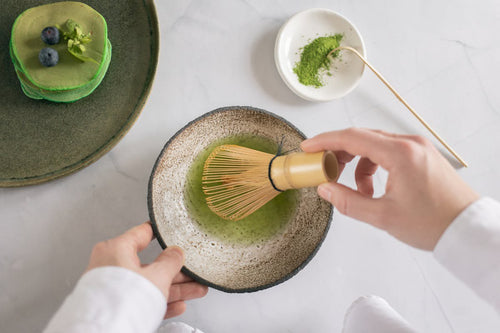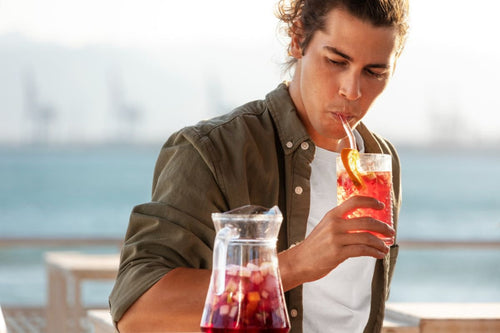Key Takeaways
- Matcha contains caffeine but generally less than coffee.
- Theanine in matcha offers a different caffeine experience, lessening jitters.
- Caffeine content in matcha varies based on factors like leaf age, harvest season, and preparation.
- A typical serving of matcha can have more caffeine than a serving of regular green tea.
- Limiting matcha powder and using cooler water can reduce caffeine intake.
- Matcha lattes may have diluted caffeine levels due to the addition of milk or milk substitutes.
- Matcha offers additional health benefits, including mood improvement and potential oral health gains.
Many people go to matcha as a potentially healthier alternative to coffee, but it’s important to note that it does still contain caffeine.

Even though matcha does contain caffeine, it also contains another compound called theanine - which when combined with caffeine, can give a very different experience than that of coffee.
So, although matcha may have considerably lower amounts than most coffee brands - how much caffeine does matcha contain? And is it still too much for you?
How Much Caffeine Is in Matcha?
Matcha does have a significant amount of caffeine in it albeit, generally not as much as coffee.
When compared to regular green tea - matcha boasts significantly more flavour, antioxidants and nutrients, however, research suggests that matcha may have a higher caffeine content than most types of green tea.
It’s hard to derive an exact measurement for the amount of caffeine found in matcha as several factors can influence the caffeine content of your individual matcha powder, including:
- How old the matcha leaves are
- When they were harvested
- The temperature of your water
- How much powder you use
So if you put more matcha powder in your cup (and use warmer water), you’re likely to consume more caffeine than if you were to use less powder and cold water.
It should also be noted that using milk as a substitute for water will not influence the caffeine content of your matcha.
With that in mind, matcha still has a relatively high caffeine content with some research suggesting that one gram of matcha contains between 18.9 and 44.4 milligrams of caffeine.

Matcha Caffeine Content: Is Matcha Stronger Than Coffee?

If you want to reduce your caffeine intake (and get an extra boost of nutrients while you’re at it), switching from coffee to matcha may be a good call. On average, matcha contains less caffeine than a cup of coffee.
However, let’s keep an emphasis on average. Although the average cup of coffee contains 80-100mg of caffeine, matcha can contain anywhere between 75.6 to 177.6mg per cup - that’s a pretty big ballpark.
The caffeine content of coffee can also vary - depending on the type of coffee and how you make it - with some servings containing as much as 200mg per serving.
So, if you want to make the switch to matcha and reduce your caffeine content, how can you ensure you’re consuming less than the average cup of coffee?
While there’s no hard and fast way to measure the amount of caffeine in your matcha, limiting how much powder you use can reduce your caffeine intake.
Instead of using two teaspoons, try switching to just one. You can also use cooler water to make your drink, which may reduce the amount of caffeine you get per serving.
It’s important to also note that the presence of theanine in matcha blunts the stimulating effects of the caffeine - meaning it can feel very different to the caffeine rush you experience from coffee.

Caffeine Content of Matcha Vs Regular Green Tea
While both matcha and regular green tea originate from the same Camellia sinensis plant, their caffeine content is far from identical. This divergence is largely due to the different processing methods and parts of the plant used in each type of tea.
Specifically, caffeine in matcha is between 18.9 and 44.4 milligrams per gram. In contrast, regular green tea typically holds between 30 to 50 mg of caffeine per 120ml serving. Given that a typical serving of matcha uses about 2 grams of powder, this equates to approximately 37.8 to 88.8 mg of caffeine per serving. This suggests that matcha may contain more caffeine than regular green tea.
The higher caffeine content in matcha is attributed to the fact that it is made from ground whole tea leaves, thereby including the nutrients and caffeine from the entire leaf.
Regular green tea, however, is made from steeping the tea leaves, which results in a dilution of caffeine.
This makes matcha a more concentrated source of caffeine, offering a stronger kick for those who need it, while regular green tea provides a milder option.
If you're curious about how different teas stack up in terms of caffeine, our article on "Which Tea Has the Most Caffeine?" offers a thorough breakdown.
What Is Caffeine?
Caffeine is a naturally occurring stimulant that’s usually found in nature in such plants as cacao, coffee and tea. When ingested by humans - it acts as a drug that has the ability to stimulate the brain and nervous system, resulting in improved performance and alertness.
Caffeine works by absorbing into the gut and the bloodstream. From here, it makes its way to the liver, where it’s broken down and can affect various organs. However, the main effects of caffeine occur in the brain.
When caffeine enters our bodies, it blocks the effects of adenosine, a neurotransmitter that makes us feel sleepy by relaxing the brain.

Without caffeine, adenosine levels accumulate throughout the day, making us increasingly more tired and helping us get to sleep when we climb into bed.
However, caffeine interrupts this process and can help us stay awake for longer by connecting with the adenosine receptors and not activating them. This inhibits the ability of adenosine to perform its job, which means you can stay awake for longer.
Some evidence suggests that caffeine may also increase the activity of dopamine and norepinephrine, as well as increasing blood adrenaline levels.
This combination helps stimulate the brain even more and contributes to the heightened sense of alertness and focus we feel when we consume enough caffeine.
The Pros And Cons Of Caffeine
Caffeine is the most popular naturally occurring stimulant in the world.
Although most of us drink it for its ability to get us out of bed in the morning and keep us going through the day, there are other pros (and cons) of consuming caffeine you should know about.
The Pros Of Caffeine
- May Reduce the Risk of Type 2 Diabetes: Evidence suggests that coffee (both caffeinated and decaf) may improve the markers for type 2 diabetes.
- Can Increase Alertness: Evidence suggests that the average 75mg serving of caffeine can improve our alertness and attention levels.
- May Improve Brain Function: Coffee is rich in polyphenol antioxidants. Research has found that drinking coffee may slow mental decline and improve our thinking and reasoning skills.
- Could Reduce the Risk of Alzheimer's and Parkinson's: Remarkably, the science suggests that lifelong consumption of caffeine could reduce the risk of developing both Alzheimer's and Parkinson’s. However, more research is needed to confirm this.
Caffeine is also thought to reduce the onset of other diseases and illnesses, including:
- Cancers of the mouth and throat
- Kidney stones
- Cataracts
- Eyelid Spasms
Again, the research behind these claims is quite limited and many more studies are required to confirm this.

The Cons Of Caffeine
Although caffeine has an impressive selection of health benefits, it doesn’t come without its risks.
Caffeine is known for its ability to induce a temporary sense of alertness, but in some people, this can cause uncomfortable symptoms - especially if more than 400mg of caffeine are consumed per day.
Some of the uncomfortable symptoms associated with excessive caffeine consumption can include:
- Irregular heart rate
- Headaches
- Dependence
- Irritability
- Gastrointestinal issues, such as diarrhoea, nausea, and stomach upset
- Disturbed sleep
- Tremors and shakes
- Increased anxiety
- Dehydration
- High blood pressure
Caffeine can even interact with some medications, including:
- Antibiotics
- Some antidepressants
- Antipsychotics, including clozapine
- Carbamazepine
- Bronchodilators
- Diuretics
- Estrogens
If you’re taking prescribed medication and you’re concerned about potential interactions with caffeine, consult a physician for more information.
Although matcha and caffeinated coffee will share many of these pros and cons, matcha has its own unique set of health benefits. For example, drinking matcha may:
- Improve Mood: Matcha contains L-Theanine, which is believed to increase alpha waves in the brain, and promote relaxation without causing drowsiness.
- May Improve Oral Health: There is also some evidence to suggest that matcha can improve our oral health. As our oral health is so closely connected to our general well-being, the potential benefits of this could be far-reaching.
Matcha has also been tentatively linked to a decreased risk of heart disease, improved cognitive function, anti-cancer properties, and more.

Factors That May Affect The Caffeine Content of Matcha
The caffeine content in your cup of matcha can vary based on a range of elements. Here's a breakdown of what could influence the caffeine levels:
-
Leaf Age: Typically, younger leaves have higher caffeine content. Matcha is often sourced from these leaves, which can elevate its caffeine levels.
-
Harvest Season: The season in which the tea leaves are harvested can alter their nutritional makeup, including the caffeine concentration.
-
Processing Method: The unique shading process that matcha leaves undergo before harvest can increase their caffeine content. Further, the act of grinding the leaves into a fine powder concentrates all of its components, caffeine included.
-
Brewing Time: Although matcha doesn't require steeping, the duration of whisking can have a subtle impact on its caffeine content.
-
Water Temperature: Hotter water can extract caffeine more efficiently. Interestingly, the temperature can also affect the taste and other nutrient levels in matcha.
-
Amount of Matcha Powder: The quantity of matcha powder used will directly influence the caffeine content in your cup. This gives you some control over your caffeine intake.
- Mixing Milk: When milk is added to make a matcha latte, the caffeine content may be affected by the type and amount of milk or milk substitute used. While the milk itself doesn't contain caffeine, it may dilute the matcha, potentially reducing the overall caffeine concentration in the beverage.
Frequently Asked Questions
How long does matcha caffeine last?
The caffeine in matcha typically lasts for 6-8 hours, which is longer than the caffeine in coffee. This is because matcha contains an amino acid called L-theanine, which slows down the body's absorption of caffeine. This results in a more sustained release of energy and alertness, without the jitters or crashes that can be associated with coffee.
However, the exact amount of time that the caffeine in matcha lasts will vary from person to person, depending on factors such as age, metabolism, and overall health.
Will matcha keep me awake?
Yes, matcha can keep you awake due to its caffeine content. However, the caffeine in matcha is released more slowly than the caffeine in coffee, resulting in a more sustained and gentle energy boost.
Is matcha better than coffee for anxiety?
For people with anxiety, matcha may be a better choice than coffee due to its lower caffeine content and the presence of L-theanine, an amino acid with calming and relaxing effects.
The Bottom Line
Matcha is widely available, easy to prepare, and comes with many research-backed health benefits.
Although matcha still contains caffeine, it can contain considerably less than coffee and has a quite different effect on the brain and body due to its combination with the compound - L-theanine.
If your morning coffee gives you the jitters, or you want something to help you through the afternoon that won’t ruin your sleep that night - matcha might be a great swap for you.














